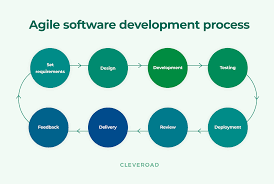Unlocking Success Through Agile Software Development
The Power of Agile Software Development
Agile software development has revolutionized the way software projects are executed, delivering greater flexibility, collaboration, and efficiency. Unlike traditional waterfall methods, agile embraces change and prioritizes customer satisfaction through continuous delivery of valuable software.
Key Principles of Agile
Agile is guided by several core principles:
- Customer Collaboration: Agile values customer feedback and involvement throughout the development process.
- Iterative Development: Projects are broken down into smaller iterations or sprints for incremental delivery and feedback.
- Adaptability: Agile teams are adaptable and respond to changing requirements quickly.
- Cross-functional Teams: Collaboration among team members with diverse skills leads to better solutions.
- Continuous Improvement: Regular retrospectives help teams reflect on their processes and make necessary adjustments for improvement.
The Benefits of Agile
Agile offers numerous benefits to both development teams and customers:
- Rapid Delivery: Incremental releases allow for faster delivery of working software.
- Frequent Feedback: Continuous feedback loops ensure that the end product meets customer needs effectively.
- Better Quality: With regular testing and reviews, quality issues are identified early in the process.
- Increased Flexibility: Agile enables teams to adapt to changing requirements and market conditions more easily.
- Enhanced Collaboration: Close collaboration among team members fosters innovation and problem-solving.
The Agile Frameworks
There are several popular agile frameworks used in software development, including Scrum, Kanban, Extreme Programming (XP), and Lean. Each framework has its own set of practices and guidelines to support agile principles.
In Conclusion
Agile software development has become a cornerstone in modern software engineering, enabling teams to deliver high-quality products efficiently while responding to changing requirements. By embracing agility, organizations can stay competitive in today’s fast-paced digital landscape.
Top 5 Frequently Asked Questions About Agile Software Development
- What is agile software development?
- What are the key principles of agile methodology?
- How does agile differ from traditional waterfall development?
- What are the benefits of adopting agile practices in software development?
- Which agile framework is best suited for my team’s needs?
What is agile software development?
Agile software development is a methodology that emphasizes flexibility, collaboration, and customer satisfaction in the process of creating software. Unlike traditional waterfall approaches, agile breaks down projects into iterative cycles, allowing for continuous feedback and adaptation to changing requirements. Agile teams prioritize delivering working software in incremental stages, ensuring that customer needs are met effectively. By fostering close collaboration among team members with diverse skills and promoting a culture of continuous improvement, agile enables organizations to respond swiftly to market demands and deliver high-quality products efficiently.
What are the key principles of agile methodology?
The key principles of agile methodology serve as guiding philosophies that underpin the agile approach to software development. These principles emphasize customer collaboration, iterative development, adaptability, cross-functional teamwork, and continuous improvement. By prioritizing customer feedback, breaking down projects into manageable iterations, embracing change, fostering collaboration among diverse team members, and regularly reflecting on processes for enhancement, agile methodologies aim to deliver value-driven solutions that meet evolving customer needs effectively and efficiently.
How does agile differ from traditional waterfall development?
In the realm of software development, the key distinction between agile and traditional waterfall methodologies lies in their approach to project execution. While the waterfall model follows a sequential, linear process where each phase must be completed before moving on to the next, agile embraces an iterative and incremental approach. Agile focuses on delivering working software in smaller, manageable increments through sprints or iterations, allowing for flexibility, adaptability to change, and continuous customer collaboration. In contrast, the waterfall model requires detailed planning upfront and has limited room for adjustments once development begins. Agile’s emphasis on responsiveness to customer feedback and evolving requirements sets it apart from the more rigid and structured nature of traditional waterfall development.
What are the benefits of adopting agile practices in software development?
Adopting agile practices in software development offers a multitude of benefits that contribute to project success and customer satisfaction. Agile methodologies promote rapid delivery of working software, allowing for early and continuous feedback from stakeholders. This iterative approach not only enhances the quality of the final product but also enables teams to adapt to changing requirements efficiently. By fostering collaboration among team members with diverse skills, agile practices promote innovation and problem-solving, ultimately leading to improved project outcomes and increased customer value.
Which agile framework is best suited for my team’s needs?
When considering which agile framework is best suited for your team’s needs, it’s essential to evaluate factors such as the size and structure of your team, the nature of your projects, and the level of experience with agile practices. Scrum is a popular choice for teams looking for a structured approach with defined roles and ceremonies. Kanban is ideal for teams seeking continuous flow and visual management of tasks. Extreme Programming (XP) focuses on engineering practices and is suitable for teams emphasizing quality and collaboration. Ultimately, the best agile framework for your team will depend on your specific requirements and goals, so it’s important to assess each framework’s principles and practices to determine the most suitable fit.



